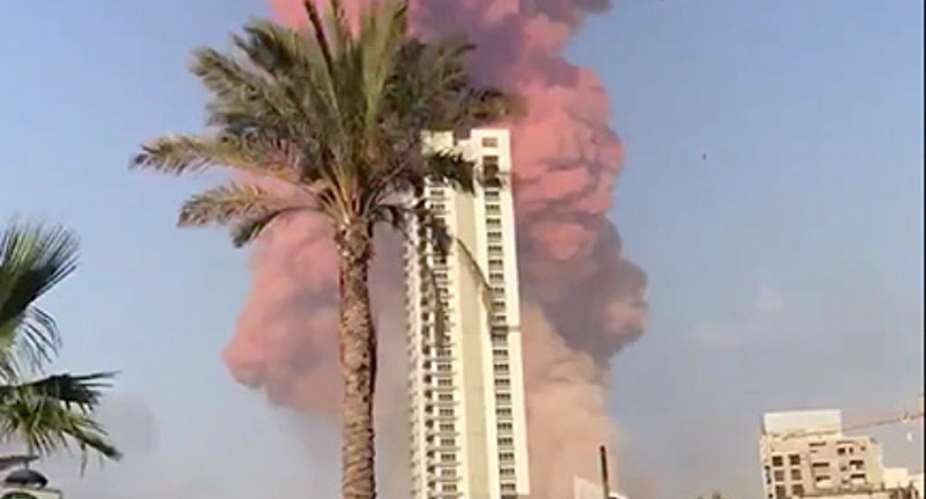Massive explosions rocked Beirut on Tuesday, flattening much of the port, damaging buildings across the Lebanese capital and sending a giant mushroom cloud into the sky.
Following this Tuesday's blasts, Lebanon's health minister initially said more than 25 people were killed and over 2,500 injured.
The number of dead is not immediately known, but hours later, ambulances were still carrying away the wounded and officials said Beirut's hospitals were full. Army helicopters helped battle fires raging at the port.
The cause of the blast has not been confirmed, but Abbas Ibrahim, chief of Lebanese General Security, has said it may have been caused by highly explosive material that was confiscated from a ship that was being stored at the port.
Local television channel LBC has reported the material was sodium nitrate.
Israel not involved
An Israeli government official said Israel “had nothing to do” with the blast. He spoke on condition of anonymity because he was not authorized to discuss the matter with the media. Israeli officials usually do not comment on “foreign reports.”
The blast was stunning even for a city that has seen civil war, suicide bombings and bombardment by Israel. It could be heard and felt as far away as Cyprus, more than 200 kilometres across the Mediterranean.
France pledges support
French Foreign Minister Jean-Yves Le Drian said Tuesday evening that France stood "alongside Lebanon" and was ready to help.
"France stands and will always stand by the side of Lebanon and the Lebanese. It is ready to provide assistance according to the needs expressed by the Lebanese authorities," he said in a tweet.
Beirut's health services compromised
Emergency teams streamed in from across Lebanon to help a health care system already strained by the coronavirus. Red Cross official Georges Kettaneh said the injured were being taken to hospitals outside the capital because facilities there were at capacity. He put the number of casualties in the hundreds but said he did not have exact figures on dead or injured.
Some of those injured lay on the ground at the port, Associated Press staff at the scene said. A civil defense official said there were still bodies inside the port, many of them under debris.
Toxic cloud reported following blasts
Witnesses reported seeing a strange orange-colored cloud over the site after the explosion. Orange clouds of toxic nitrogen dioxide gas often accompany an explosion involving nitrates.
Initially, video taken by residents showed a fire raging at the port, sending up a giant column of smoke, illuminated by flashes of what appear to be fireworks. Local TV stations reported that a fireworks warehouse was involved.
The fire then appeared to catch at a nearby building, triggering a more massive explosion, sending up a mushroom cloud and a shock wave.
Charbel Haj, who works at the port, said it started as small explosions like firecrackers. Then, he said, he was thrown off his feet by the huge blast. His clothes were torn.
Miles from the port, building facades were shredded, balconies were knocked down and windows shattered. Streets were covered with glass and bricks and lined with wrecked cars. Motorcyclists picked their way through traffic, carrying the injured.
One woman covered in blood from the waist up walked down a trashed street while talking furiously on her phone. On another street, a woman with a bloodied face looked distraught, staggering through traffic with two friends at her side.
“This country is cursed,” a young man passing by muttered.
The blast came at a time when Lebanon's economy is facing collapse, hit both by a financial crisis and coronavirus restrictions. Many have lost jobs, while the worth of their savings has evaporated as the currency has plunged in value against the dollar. The result has thrown many into poverty.
It also occurred amid rising tensions between Israel and the militant Hezbollah group along Lebanon's southern border.





 We’ll no longer tolerate your empty, unwarranted attacks – TUC blasts Prof Adei
We’ll no longer tolerate your empty, unwarranted attacks – TUC blasts Prof Adei
 Bawumia donates GHc200,000 to support Madina fire victims
Bawumia donates GHc200,000 to support Madina fire victims
 IMF to disburse US$360million third tranche to Ghana without creditors MoU
IMF to disburse US$360million third tranche to Ghana without creditors MoU
 Truck owner share insights into train collision incident
Truck owner share insights into train collision incident
 Paramount chief of Bassare Traditional Area passes on
Paramount chief of Bassare Traditional Area passes on
 Two teachers in court over alleged illegal possession of BECE papers
Two teachers in court over alleged illegal possession of BECE papers
 Sunyani: Victim allegedly shot by traditional warriors appeals for justice
Sunyani: Victim allegedly shot by traditional warriors appeals for justice
 Mahama vows to scrap teacher licensure exams, review Free SHS policy
Mahama vows to scrap teacher licensure exams, review Free SHS policy
 Government will replace burnt Madina shops with a new three-story, 120-store fac...
Government will replace burnt Madina shops with a new three-story, 120-store fac...
